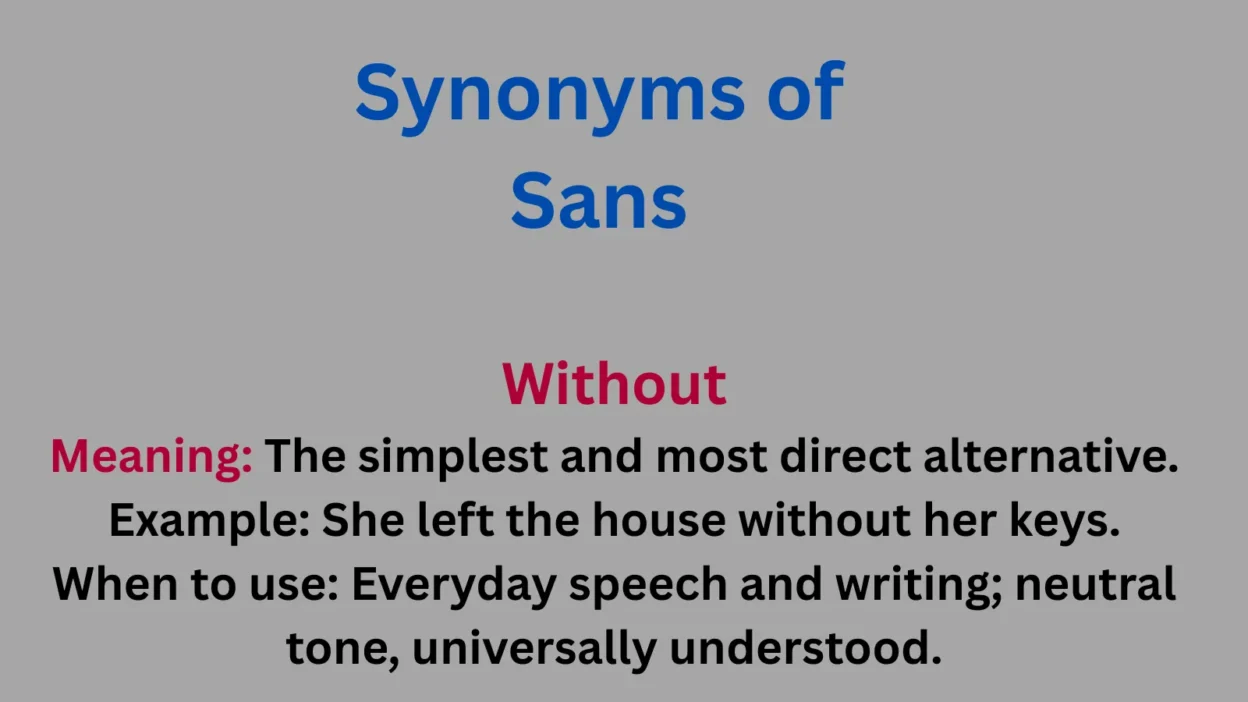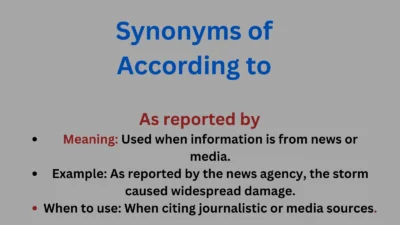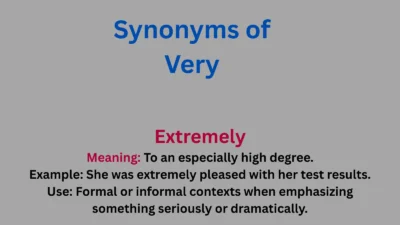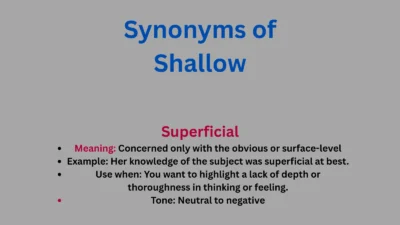Synonyms of sans can enrich your vocabulary and elevate your writing instantly. While sans is a sleek, borrowed term meaning “without,” the English language offers many powerful alternatives. Whether you’re crafting a formal document, poetic line, or casual sentence, knowing the right synonym—like lacking, devoid of, or absent—can fine-tune your tone and clarity.
This guide explores the best sans synonyms with meanings and examples to help you write with precision and style. From academic essays to creative storytelling, finding the right substitution matters.
Never feel limited—this list of synonyms of sans ensures you’re never sans the perfect word.
What Does Sans Mean?
The word sans is a preposition borrowed from French, meaning without. It’s often used in a stylish or slightly formal way to indicate the absence of something. For example, coffee sans sugar means coffee without sugar.
Though sans itself is straightforward, its vibe can range from modest and reserved to a bit playful or literary, depending on how you use it. It often carries a tone that’s either casual yet refined, or humorous and quirky when used in everyday conversation.
In short, sans is about omission or absence, often with a subtle style or emotional nuance. Now, let’s explore some synonyms that share this “without” meaning, along with their unique flavors.
30 Synonyms of Sans with Examples and Usage Tips
1. Without
Meaning: The simplest and most direct alternative.
Example: She left the house without her keys.
When to use: Everyday speech and writing; neutral tone, universally understood.
2. Devoid of
Meaning: Completely lacking something, often in a serious or formal context.
Example: His speech was devoid of emotion.
When to use: Formal or literary writing; conveys total absence with gravity.
3. Lacking
Meaning: Missing or deficient in something.
Example: The report is lacking sufficient data.
When to use: Descriptive contexts emphasizing insufficiency or absence.
4. Bereft of
Meaning: Emotionally or physically deprived of something.
Example: She was bereft of hope after the news.
When to use: Poetic or emotional contexts; expresses loss or sorrow.
5. Missing
Meaning: Not present or lost.
Example: The document is missing a signature.
When to use: Practical or casual situations; physical absence.
6. Free from
Meaning: Not affected by or containing something undesirable.
Example: This juice is free from preservatives.
When to use: Positive contexts emphasizing purity or safety.
7. Excluding
Meaning: Leaving something out intentionally.
Example: The price is calculated excluding taxes.
When to use: Formal or legal contexts; when something is deliberately omitted.
8. Absent
Meaning: Not present at a place or in a situation.
Example: The manager was absent from the meeting.
When to use: Formal or neutral; presence-related absence.
9. Void of
Meaning: Empty or lacking something completely.
Example: His eyes were void of any expression.
When to use: Formal or poetic; strong emotional or physical absence.
10. Exempt from
Meaning: Free from an obligation or rule.
Example: Students are exempt from the fee.
When to use: Legal or official, indicating permission to skip something.
11. Hollow of
Meaning: Empty inside, lacking substance or meaning.
Example: His promises were hollow of sincerity.
When to use: Literary, emphasizing emptiness in meaning or value.
12. Shorn of
Meaning: Stripped of something, often suddenly or forcefully.
Example: The army was shorn of its leadership.
When to use: Literary or historical; dramatic removal.
13. Destitute of
Meaning: Completely lacking, especially in resources or qualities.
Example: The area was destitute of clean water.
When to use: Formal or dramatic; emphasizes hardship or scarcity.
14. Clear of
Meaning: Free from obstruction or impurities.
Example: The sky was clear of clouds.
When to use: Neutral; often about physical or visual absence.
15. Void
Meaning: Empty or invalid, sometimes legally.
Example: The contract was declared void.
When to use: Legal or formal; invalidity or emptiness.
16. Barred from
Meaning: Prevented from entering or accessing.
Example: He was barred from the club.
When to use: Legal or social exclusion contexts.
17. Excluding
Meaning: Leaving something out deliberately.
Example: The menu is excluding desserts today.
When to use: Formal or practical; deliberate omission.
18. Stripped of
Meaning: Taken away forcibly or completely.
Example: She was stripped of her title.
When to use: Emotional or dramatic contexts; loss of power or status.
19. Deprived of
Meaning: Denied possession or use of something.
Example: The children were deprived of education.
When to use: Emotional or social contexts, injustice or suffering.
20. Unaccompanied by
Meaning: Not accompanied or joined by something or someone.
Example: The package arrived unaccompanied by a receipt.
When to use: Formal, emphasizing solitary condition.
21. Destined without
Meaning: Without a certain fate or purpose.
Example: A plan destined for success.
When to use: Rare; poetic or philosophical.
22. Sans (itself)
Meaning: Without, often stylish or quirky.
Example: Dinner sans wine felt dull.
When to use: Casual writing with a playful or elegant tone.
Looking for better ways to say it? Visit Repilly.com for smarter, clearer alternatives to everyday phrases!
23. Minus
Meaning: Subtracting or without a particular element.
Example: The bill came minus tax.
When to use: Mathematical or informal contexts.
24. Lacking in
Meaning: Deficient or missing a quality or item.
Example: The essay was lacking in detail.
When to use: Critical or descriptive; points out insufficiency.
25. Open of
Meaning: Free from or without obstruction.
Example: The path was open of debris.
When to use: Literary; visual or physical absence.
26. Deficient in
Meaning: Not having enough of something.
Example: The diet is deficient in vitamins.
When to use: Medical or scientific contexts.
27. Unburdened by
Meaning: Free from worry, responsibility, or physical load.
Example: He felt unburdened by guilt.
When to use: Emotional or metaphorical absence.
28. Failing to have
Meaning: Not possessing something.
Example: She was failing to have the necessary skills.
When to use: Formal or academic; describing absence of ability.
29. Destitute without
Meaning: Lacking something necessary for survival or comfort.
Example: Destitute without shelter.
When to use: Dramatic or social contexts.
30. Unfurnished with
Meaning: Not provided with equipment or furniture.
Example: The apartment was unfurnished with a stove.
When to use: Practical contexts; physical absence of items.
How to Choose the Right Synonym
Choosing the perfect synonym for sans depends on:
- Tone: Use without or minus for a casual or neutral tone; bereft or destitute for an emotional, serious tone.
- Context: Formal writing might favor devoid of, absent, or exempt from; casual chat leans towards sans or without.
- Emotional Weight: Words like bereft or deprived of carry sadness or loss; free from and unburdened suggest positivity.
- Cultural/Regional Nuance: Sans is more common in British English and literary contexts; without dominates everyday American English.
For example, if you want to sound elegant and a bit quirky, sans is your go-to. If you’re writing a serious report, devoid of or lacking might fit better. And if you want to express emotional loss, bereft is powerful.
Conclusion
Words matter—especially when precision is key. This list of synonyms of sans gives you versatile options to express the idea of “without” in formal, creative, or conversational writing. From devoid of to absent, these alternatives help you avoid repetition and enhance clarity.
So the next time you’re tempted to use sans, remember: you’re never sans a better word—just one choice away from writing with style and power.
Explore, experiment, and make your language more vivid.
With these synonyms of sans, your writing will never feel lacking again.




